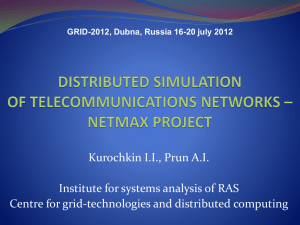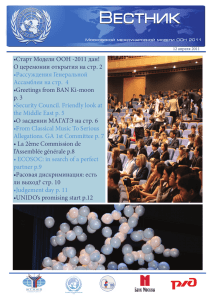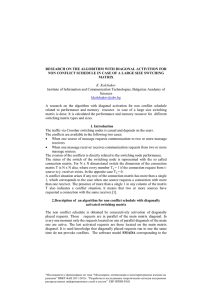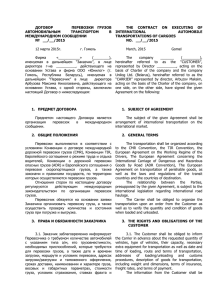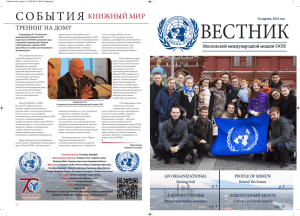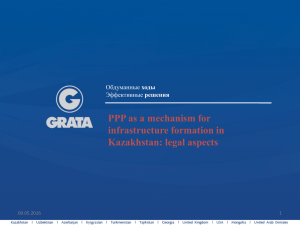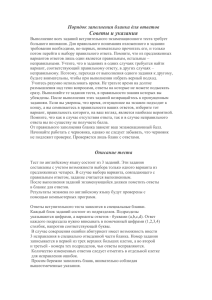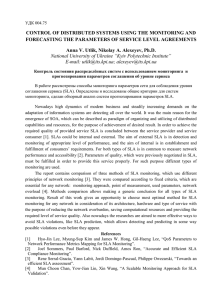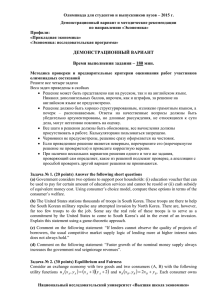Многозначная идентификация модели роста раковой опухоли и
реклама
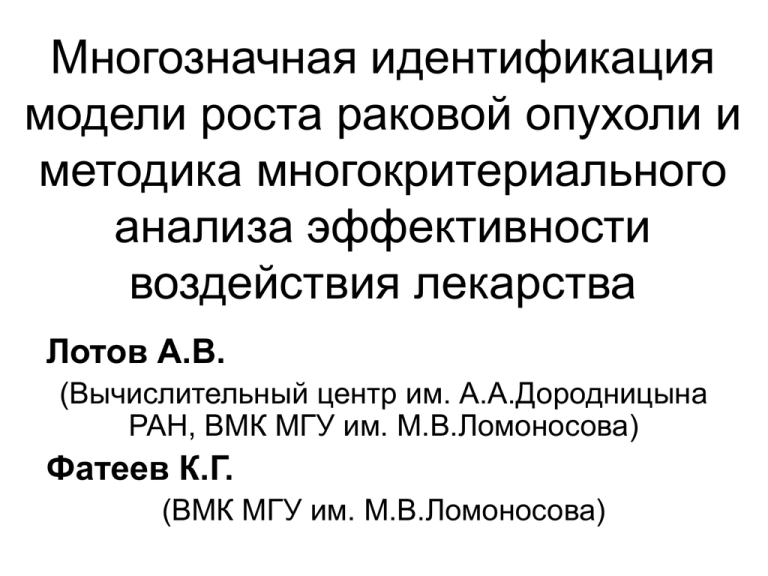
Многозначная идентификация
модели роста раковой опухоли и
методика многокритериального
анализа эффективности
воздействия лекарства
Лотов А.В.
(Вычислительный центр им. А.А.Дородницына
РАН, ВМК МГУ им. М.В.Ломоносова)
Фатеев К.Г.
(ВМК МГУ им. М.В.Ломоносова)
ПЛАН ВЫСТУПЛЕНИЯ
1. Введение
2. Идентификация параметров модели на основе
визуализации в случае неустойчивого решения
задачи идентификации
3. Аппроксимация множества критериальных точек,
достижимых при всех допустимых параметрах;
поддержка многокритериального выбора варианта
4. Многозначная идентификация модели роста
раковой опухоли
5. Методика многокритериального анализа
эффективности воздействия лекарства в случае
неоднозначных параметров
Характерные формы графика
функции ошибок
б)
а)
l
в)
l
l
2. Идентификации параметров на
основе визуализации в случае
неустойчивого решения задачи
идентификации
Let the dynamics of the system
under study to be described by
x
( k 1)
x
(k )
f ( x
(k )
,u
(k )
, l ), k 0,..., N 1
Where x R
is the state vector,
u ( k ) R r is the control vector,
all at the time-moment k,
l R p are the vector of unknown
parameters, is the time-step.
(0)
The initial state x x0
is assumed to be given.
(k )
n
Computing the error function (l ).
Let a control function uˆ ( k ) , k 0,..., N 1 be given.
(k )
V
{(
k
,
v
), k K } be the set of observations,
Let
(k )
v
where
are observable values at the time
moment k .
(k )
x
Let ˆ (l ), k 0,..., N 1 be the trajectory of the
system for the given control and a vector l .
(k )
(k )
Let vˆ (l ) ( xˆ (l )), k K , be a given relation
between trajectories and the observable values.
The error function (l ) is a function of
(k )
(k )
differences between v and vˆ (l ).
Computing the graph of the error
function and its visualization
1. The value of the error function (l ) is
computed for a large number (M) of random
vectors (l1 ,...,lM ) .
i
i
p 1
2. The set of M points (l , (l )) R , i 1,..., M
is approximated by a relatively small number
of p+1-dimensional boxes.
3. The system of boxes is visualized by its twodimensional slices.
Approximating of the graph of the
error function (l ) by boxes
Identifying a region in parameter space
• An expert points out such a region in the
parameter space (identification set) , that the
solution of the parameter identification has the
form l .
• In such an approach, the model parameters can
be identified by using a synthesis of
observations and non-formal experience of the
expert.
• The further study examines the case when the
region contains more than one point.
3. Аппроксимация множеств
критериальных точек ,
достижимых при всех
допустимых параметрах;
поддержка многокритериального
выбора варианта решения
The dynamics of the system under
study is described by
( k 1)
x f ( x , u , l ), k 0,..., N 1
(0)
Here x x0 . We assume that l
x
(k )
(k )
(k )
and l does not change in time.
For given a control function ul and a given
vector l , the equation allows constructing
the trajectory of the system
.
The trajectory tube for the entire set l and
for a given control can be approximated by a
population of trajectories generated for M
M
l
random vectors
.
The multi-criteria finite choice problem
Let us consider the problem of selecting one of L
of feasible control functions u1 ,...,u L ,
where ul (ul( k ) , k 0,..., N 1) .
Suppose that the decision problem is described
by m criteria, denoted by z and associated with
the trajectories by a given mapping z F (u, x, l.)
Then, the set of criterion uncertainty Z l for a
feasible control ul is approximated by the set of
criterion points z F (ul , xl (l ), l ) for l M .
By approximating this set by a system of boxes,
its visualization is provided. Then, the most
preferable control is selected by comparing Z l .
4. Многозначная идентификация
модели роста раковой опухоли
Simeoni M., Magni P., Cammia C.
Predictive Pharmacokinetic-Pharmacodynamic
Modelling of Tumor Growth Kinetics in Xenograft
Models after Administration of Anticancer Agents //
Cancer Research, 2004.
To identify parameters of the model, experiments with nude
(young) mouse were performed: the tumor is implanted and
hailed by using several anticancer agents.
The scheme of the
pharmacokinetic model
The pharmacokinetic model
The pharmacokinetic model for the time-moments between the
injections is
dC1
(k12 k10 )C1 (t ) k 21C2 (t )
dt
dC2
k12C1 (t ) k 21C2 (t )
dt
where C1 is the concentration of the anticancer agent in the
central part of the body (lever, lungs, heart, etc.), and C 2 is
the concentration of the anticancer agent in the peripheral
part of the body (marrow, brain, etc.).
The pharmacokinetic model-2
There is a discontinuity of C1 at the moments of
injection
C1 (t k )
C1 (t k )
DOSE
V
where DOSE is the quantity of injected agents
and V is the volume of the central part of the
body. The variable C 2 is continuous.
The scheme of the pharmacodynamic
model
The pharmacodynamic model
The identification problem
One has to identify the parameters
l0 , l1 , w0 in the case without injections, i.e.
The result of a standard identification procedure is
given by the red line.
Standard identification
Computing the approximation
In general, the error function was computed for
about 500 000 combinations of the
parameters. The set of these points in
parameter space l0 , l1 , w0 was approximated
by 3761 boxes.
Dependence of error function on
the parameters l0 and l1
Feasible values of all three
parameters for 0.15<psi<0.5
Feasible values of all three
parameters for 0.15<psi<0.23
The identification set for l0 and l1
Visual identification of w0
Visual identification of l0
Visual identification of l1
The values of the parameters
The obtained values of the parameters are:
1) By using standard method we obtain
l0 0.146, l1 0.334, w0 0.085
2) By using the visualization-based method
we obtain
l0 [0.13,0.18], l1 [0.23,0.44], w0 [0.0.34,0.11]
5. Методика
многокритериального анализа
эффективности воздействия
лекарства в случае
неоднозначных параметров
Strategies being studied when point-wise
parameter estimates are used
The following strategies have been selected from the
list of strategies in the process of multi-objective
screening of 140 strategies of drug application by
using the Pareto frontier visualization
Instability of strategies
Criteria
Here
y1 is W(10),
y2 is W(20),
y3 is the total dose of drug,
y4 and y5 are c1 and c2.
Methods for selecting from a large number
of strategies with uncertain outcomes
• Lotov A.V. Visualization-based Selection-aimed Data
Mining with Fuzzy Data. International Journal of
Information Technology & Decision Making. Vol. 5, No
4 (December 2006). P. 611-621.
• Lotov A.V., Kholmov A.V. Reasonable goals method in
the multi-criteria choice problem with uncertain
information, Doklady Mathematics, 2009, vol. 80, no.
3, 918-920.
• Lotov A.V., Kholmov A.V. Reasonable goals method in
the multi-criteria choice problem with stochastic
information, Artificial Intelligence and Decision Making,
2010, № 3, с. 79-88 (in Russian, to be translated in
Scientific and Technical Information Processing).
Summary of the talk
We propose a graphic method for constructing the sets
of uncertainty for model parameters. This knowledge
is used in the framework of our methods for
approximating the trajectory tubes by their slices (the
reachable sets or the sets of uncertainty). The slices
inform on the possible deviations from the nonperturbed trajectory.
Approximating the set in criterion space accessible for
all possible parameters can be carried out as well.
Thus, the technique also offers supporting the
decision making, including the multi-objective decision
problems with models, which parameters are known
not precisely.
Our Web site
• http://www.ccas.ru/mmes/mmeda/
Дополнение.
Покрытие многомерных
невыпуклых множеств
параллелотопами
Remark: Covering a multi-dimensional set
Let A R be a non-convex set. Let T A be
a finite set. Then h( A, T ) max ( x, T ) : x A.
Let ( x, y) be the Tchebychev distance among
points x, y , i.e. ( x, y) max xi yi , i 1,...,.n
Then, -neigh-hood of the point x is the set
n
U ( x) y R n : xi yi
.
i.e. a box. If h( A,T ), then U ( , T ) xT U ( x)
provides a (full) covering of the set A.
Approximating a multi-dimensional set
If h( A,T ) , then the set U ( ,T ) covers the set
A only partially. The set T is called the
covering base. Let H be a sample of M points of
A. Let m( ) card( x H : x U ( , T )) .
Then, T ( ) m( ) M is the completeness
function of the covering provided by the base T.
The Deep Hole of the set H for the covering
base T is the set
DH ( H , T ) x H : ( x, T ) h( H , T )
Application of the Deep Holes method for
approximating a multi-dimensional set
Let describe the j-th iteration of the DH method.
On the previous iterations, the covering base T j 1 must
be constructed.
1. Let generate a sample H of M points of A.
2. Compute and display the function T ( ) ;
j
3. If the expert is satisfied by the completeness for the
covering base T j 1 and some value of ,
j
then stop else let T j T j 1 x ,
where x j DH ( H , T j 1 )
;
4. Start new iteration.
Detailed description of the method
is provided in
Каменев Г.К. Визуальная
идентификация параметров
моделей в условиях
неоднозначности решения,
Математическое моделирование,
2010, т.22, № 9, с. 116-128.
